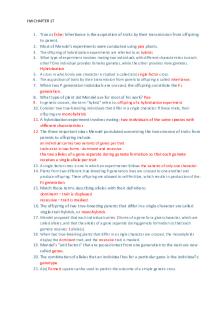History 102 (Part 17) - Professor: Samantha Perez PDF

| Title | History 102 (Part 17) - Professor: Samantha Perez |
|---|---|
| Course | Western Civilization To 1500 For Honor Students |
| Institution | Southeastern Louisiana University |
| Pages | 2 |
| File Size | 43.1 KB |
| File Type | |
| Total Downloads | 106 |
| Total Views | 147 |
Summary
Professor: Samantha Perez...
Description
Charles I of England (r. 1625 – 1649) Son and successor of James I o Influenced by policies and absolutism of his father Believes in divine right of Kings Protestant but Catholic sympathies o 1625- Married Henrietta Maria, Sister of Louis XIII of France (Catholic) o Tries more catholic- learning reform within Anglican Church o Angers puritans in Parliament! Abuses Parliament o Only summons parliament when he needs money Charles I’s Parliament Problems Charles constantly in need of money o Looks for way to boost revenue without summoning parliament o Begins to issue taxes (without parliament’s consent!) and forced loans, abuse the rights of English people 1628-Parliament issues the Petition of Rights, a constitutional document limiting the king’s power o No taxation without Parliament’s consent o No housing soldiers in private homes o No marital laws during peacetime o No imprisonment without due cause Charles agrees to petition, receives money from Parliament, then disbands parliament o Doesn’t summon Parliament again for 11 years o Increasingly dire financial situation for Charles Bishops’ War’nd Short and Long Parliament Charles I also tries to exert uniformity and absolute command over churches in his united British territories (England, Ireland, Scotland) o Goal: Create a unified church of his British territories (including Calvinist Scotland) o But irreconcilable differences between Calvinism and Anglicanism! Leads to the Bishops War (1639 – 1640) o Scotland resists Charles I’s Anglican religious edicts, rebels against English religious standards o Now Charles needs money to defeat Scotland Charles I forced to summon Parliament for money to build army… Short & Long Parliament 1640- Short Parliament o Charles summons parliament to fund Bishops’ war o Get money, immediately disbands parliament 1640 – 1654- Long Parliament
Summoned again for money This time, they refuse to disband without their consent Nobles and commoners gain power away from monarch Pass the Triennial Act: mandates that Parliament be called at least once every 3 years Increased puritan religious- political influence in parliament Tensions between Charles I and Parliament almost at breaking point o o o o
...
Similar Free PDFs

Perez, partcipation part 2
- 5 Pages

Week 17 - Task part 1 : WEEK 17
- 1 Pages

History of Facebook Part 3
- 32 Pages

Evidencia 2. Samantha Roman
- 13 Pages
Popular Institutions
- Tinajero National High School - Annex
- Politeknik Caltex Riau
- Yokohama City University
- SGT University
- University of Al-Qadisiyah
- Divine Word College of Vigan
- Techniek College Rotterdam
- Universidade de Santiago
- Universiti Teknologi MARA Cawangan Johor Kampus Pasir Gudang
- Poltekkes Kemenkes Yogyakarta
- Baguio City National High School
- Colegio san marcos
- preparatoria uno
- Centro de Bachillerato Tecnológico Industrial y de Servicios No. 107
- Dalian Maritime University
- Quang Trung Secondary School
- Colegio Tecnológico en Informática
- Corporación Regional de Educación Superior
- Grupo CEDVA
- Dar Al Uloom University
- Centro de Estudios Preuniversitarios de la Universidad Nacional de Ingeniería
- 上智大学
- Aakash International School, Nuna Majara
- San Felipe Neri Catholic School
- Kang Chiao International School - New Taipei City
- Misamis Occidental National High School
- Institución Educativa Escuela Normal Juan Ladrilleros
- Kolehiyo ng Pantukan
- Batanes State College
- Instituto Continental
- Sekolah Menengah Kejuruan Kesehatan Kaltara (Tarakan)
- Colegio de La Inmaculada Concepcion - Cebu











